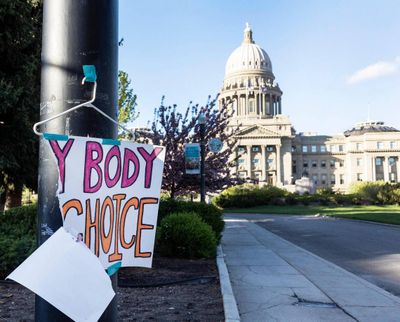Idaho House committee moves ‘abortion trafficking’ bill forward

The Idaho House State Affairs Committee moved forward a bill on Friday that would make it a felony crime to transport or recruit a minor for an abortion without parental consent.
Rep. Barbara Ehardt, R-Idaho Falls, and Rep. Kevin Andrus, R-Lava Hot Springs, presented the bill, which would make it a felony crime punishable by two to five years in prison to take a child without parental consent to get an abortion. Elective abortion is illegal in Idaho, with rare exceptions for reported rape, incest and the life of the mother.
The nearest out-of-state abortion clinics for most Idahoans are in Oregon and Washington. In Washington, minors can legally get an abortion without parental consent. In Oregon, girls 15 and older can get an abortion without parental consent, but girls 14 and younger do need parental permission. Montana law requires parental permission, but that law is temporarily enjoined by a court order, meaning the policy isn’t in effect. Wyoming and Utah have bans on elective abortions.
Megan Wold, of Right to Life Idaho, pointed to human trafficking victims, not just young girls in need of abortion.
She said she felt that the bill would help girls who are the victims of human trafficking or who were impregnated by an adult if the traffickers sought an abortion to conceal evidence of statutory rape.
David Ripley, executive director of Idaho Chooses of Life, supported the legislation, calling it “extraordinarily righteous.”
“We now live in a different world than we did just last session,” Ripley said. “Most abortions in Idaho are illegal.”
Nora Morse, representing Planned Parenthood, testified in opposition to the bill, arguing that the bill would discourage minors from asking for help.
The bill also includes a civil enforcement action which would allow people to sue providers or people who knowingly or recklessly performed an abortion under the circumstances outlined. The action could be filed up to six years after the abortion occurred.
The committee advanced the bill to the House floor in a party line vote.
Also Friday, Sen. Phil Hart, R-Kellogg, pitched House Joint Memorial 2, a resolution to ask Congress to limit the jurisdiction of the lower federal courts from hearing cases that relate to state legislative authority to pass laws regarding abortion. The resolution requests that those cases be heard in the state courts.
Hart highlighted the fact that in the state courts, the judges are chosen by the people. He said it would also allow the Legislature to draft legislation more effectively.
State Affairs Committee members advanced the resolution in a party line vote.